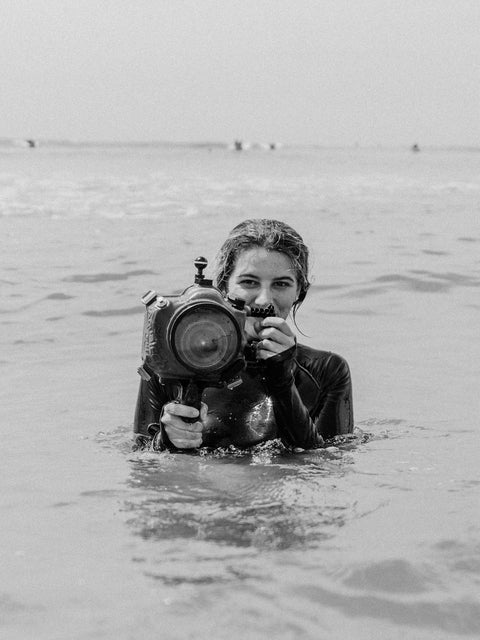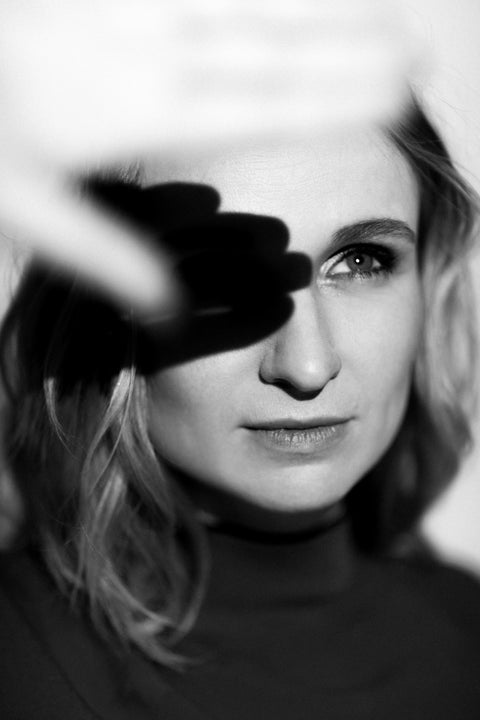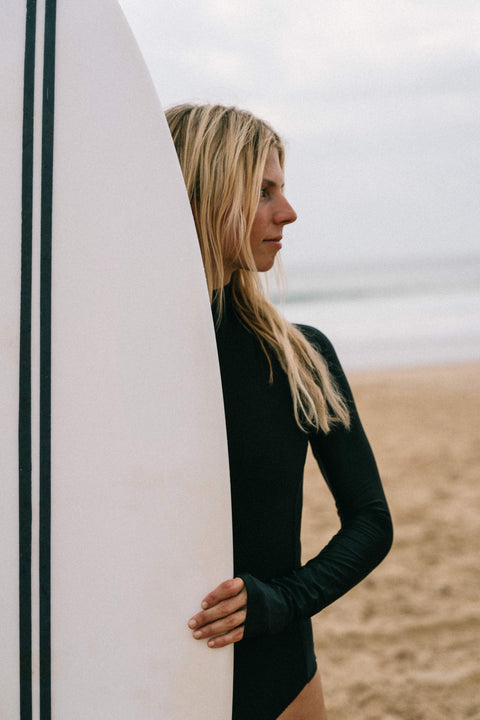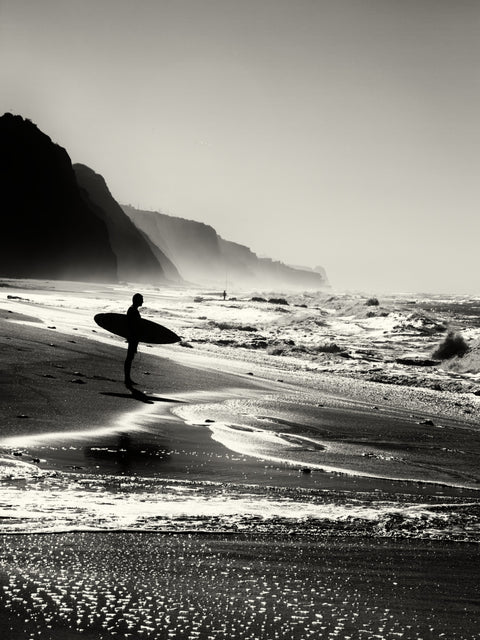
Salty Lens, Clean Conscience: Inside Pathos Collective with Lauren Weiss
Serendipity has a way of pulling kindred spirits into the same tide. That’s how we crossed paths with Lauren Weiss of Pathos Collective, a photographer who turns ocean trash into art and frustration into fuel.
From the rivers of Missouri to the swells of California, she’s forged a practice where every frame pulses with the energy of the ocean and the weight of what we stand to lose. Lauren embodies exactly what we're drawn to: someone who refuses to separate art from values. Her underwater lens captures what most never see, documenting brands that actually care about the planet. It's the kind of authentic advocacy that cuts through the noise.
This conversation dives deep into the intersection of creativity, commerce, and conservation. Because if you're going to make waves, might as well make them count.
All images courtesy of Lauren Weiss VSC: You went from landlocked Missouri to underwater photography in California, what was that awakening like, and how did those first encounters with ocean trash shape your artistic vision?
VSC: You went from landlocked Missouri to underwater photography in California, what was that awakening like, and how did those first encounters with ocean trash shape your artistic vision?
LW: I first encountered the ocean in Hawaii when I was 6. The first thing I did when I saw the ocean was run to the water. I caught a fish with my bare hands and took it with me to show my parents. I was completely enamoured with the water, entirely hooked, and just knew somehow I would need to do something with the ocean throughout my life.
Being landlocked was difficult, but it made me that much more determined to preserve my memories in photographs and become an advocate for something I loved but couldn't see. When the BP oil spill happened I started to become more interested in conservation and ecological preservation. It is funny (not actually funny though) thinking back that a lot of the initial encounters I had with the ocean came through experiences at SeaWorld or Discovery Cove.... it's interesting how an experience at these incredibly exploitative parks gave me that access and changed my perspective.
As an adult looking back, I'm grateful for those opportunities in which I encountered the ocean, but they also taught me that ocean access in America is largely about privilege. Growing up in Missouri, I was much more readily aware of the implications of living along a massive water way and the ecological impacts that can have on the ocean. Just because it was out of sight didn't mean it should be out of mind. VSC: What specific moment or experience crystallized your decision to pivot from environmental frustration to creating Pathos Collective?
VSC: What specific moment or experience crystallized your decision to pivot from environmental frustration to creating Pathos Collective?
LW: I had been dealing with a build up of frustration since 2019. I left Missouri and moved to Philadelphia. For some reason I had this thought that because it was more of a progressive city, the infrastructure there would be more conducive to keeping the city clean. I realize now I was naive to how our country is set up both locally and nationally.
When I moved to LA—I accidentally ended up moving to one of the nicest neighborhoods in the country by complete chance—I was shocked to also see the lack of enforcement for the fines that are supposed to be issued to people who leave their trash on the beach.
I was so frustrated because at this point it was very abundantly clear that the climate crisis is here and we need to take it seriously. From algae blooms to trash everywhere, I just felt completely confused about what I was supposed to do as an artist, and how I could meld this passion I have for environmentalism with art.
"From algae blooms to trash everywhere, I just felt completely confused about what I was supposed to do as an artist, and how I could meld this passion I have for environmentalism with art."
I started going to the beach a few times a week with a sieve to run sand through, collecting the plastic bits and putting them into clay pieces. That's when I came up with the name Pathos. Pathos by definition means to evoke feelings of sympathy, and I kind of leaned into that from an environmental standpoint, not advocating helplessness, but passion.
It’s become something much bigger now but I guess it's a testament to the power of passion and when you really follow your heart it will take you places worth going.
VSC: How do you link art and advocacy so it sparks action instead of guilt?
LW: I have to be honest—I am still figuring this one out. It’s so easy to feel overwhelmed and discouraged but I believe people need to speak about these issues more openly, because we can’t keep looking away. By destigmatizing and depolarizing these topics, we can actually find common ground.
Sometimes it’s hard for me to keep myself in check because I’m so passionate and have little tolerance for willful ignorance, but discernment is important. There’s no erasing what we know about climate change. Still, what I know, someone else may not, and that’s where balance comes in. At everyone’s core, I think we all care. It’s just about connecting the dots in conversation so people feel part of the solution, because we’re all being affected, rather than making them feel like the problem.
"It’s just about connecting the dots in conversation so people feel part of the solution, because we’re all being affected, rather than making them feel like the problem."

VSC: Your underwater photography captures something most of us never see—what's the most beautiful and most heartbreaking thing you've witnessed beneath the surface?
LW: I can’t tell you how much I appreciate that! Working in the water is very unpredictable so I never really know what it will be like day to day. Unfortunately I have seen a lot of really sad things that have occurred in the water. Currently a lot of what I am seeing is the influx of invasive species. What that means is that the ecosystems are changing and these invasive species are contributing to the ecosystems destabilizing.
In the Bahamas, where I started to get serious about underwater photography, I watched an entire coral reef become completely bleached in just 1 year. At my local spot in California, I’ve seen invasive seaweed take over and the reef shift from healthy to ragged after the fires. Recently I have been doing a lot of diving and I’ve noticed signs of recovery, which is encouraging. Still, the rise in urchins is a concern because they’re devastating for the kelp.

VSC: What's been your most successful project to date, and what's on the cards for the future that has you equally excited?
LW: It’s hard to pinpoint one project, because so much of my work is about connection, bringing people together through visuals and letting them see something they normally wouldn’t. That, to me, feels like success.
Looking ahead, I’m really excited to have just signed on as Director of Photography for 7 Seas Collective, a local non profit organization on a mission to monitor the health of our beaches along the SoCal coast. It feels really special to play a part in capturing images that get people excited about science in a way that makes ocean conservation more accessible. In the meantime I am continuing to collaborate with ethical brands and letting the wind blow me in the right direction! Opportunities are everywhere.

VSC: Walk us through one underwater shot that captures your "everything is connected" philosophy—what was running through your mind when you hit the shutter?
LW: I love this question. It’s not the best photo I’ve ever taken, but I love it since I remember vividly being in the water watching this unfold. I was freediving in Hawaii and came across a giant coral head. Waves were breaking over it, and at the same time a school of fish were swimming through a coral canyon. I was able to get the shot timed right when the fish were swimming past the part of the reef where you can see the waves breaking in the background.
Usually when I’m underwater, I don’t overthink composition—I focus on light and shadows, and I try to position myself without disturbing the scene. In this case, I was tucked behind the reef, waiting so I wouldn’t scare the fish. When it all aligned, it felt really special to see all of these tiny moments align together.
I swear something shifts in me when I'm under the surface of the water, I become so peaceful and unbothered by literally everything else around me. It honestly feels so natural, and it feels good to be immersed in an ecosystem that isn’t my own. There’s so much beauty down there, and so much to learn.

"Something shifts in me when I'm under the surface of the water, I become so peaceful and unbothered by literally everything else around me."
VSC: What sun-safe rituals—aside from sporting our UPF50+ Uluwatu Surfsuit—keep you protected for marathon shoots?
LW: I have to say that I LOVE the Uluwatu Surfsuit! It’s so comfortable and keeps me warm in the water. When I’m not in the water, I typically wear a lot of linens, for me it’s important to be comfortable and covered, especially when I’m in the sun all day. I use a reef-safe sunscreen for my face and a sun hat. Having breathable fabric is a game changer. I recently did a serious clean out of my closet and kept a lot of the more natural fabrics. I’m super active and outside more often than not, so it’s important to me to have fabrics that hold up and benefit my skin while protecting it.
VSC: When searching for sustainable surf gear, what should every eco-conscious surfer look for?
LW: I always like to go the most sustainable route for gear. Can I get something secondhand before buying brand new? Is the product made ethically? Does my purchase give back to a do-good effort? Does it perpetuate cycles of injustice? These are usually the questions I ask myself before any real purchase.
I think we’re lucky in the water world—there are more opportunities to support smaller sustainable businesses like Vampire Surf Club. A lot of ocean-loving people try to give back to something good and positively impactful.
VSC: When a brand slides into your DMs, what filters decide whether you collaborate—or archive the chat?
LW: I love this question so much because I actually have had to learn a lot being somewhat new to the more commercial side of photography! I don’t do unpaid collaborations unless I really believe in the brand or intention of the collaboration. I also work primarily with brands that are founded on ethical principles. If it's paid and not an ethical/sustainable brand I might still work with them, but reallocate part of my profit to give to ocean conservation organizations that I really believe in.
VSC: For a truly plastic-free lineup, what one daily swap would you dare our community to try?
LW: BETTER SUNSCREEN!! I am actually the worst when it comes to making sure I wear sunscreen when I'm at the beach. Because I am always in the water I personally am not the most comfortable wearing it. Thats why I am obsessed with my mineral face sunscreen and my Uluwatu surf suit! I also am a big believer in a pre water activity coffee- I like to bring my own cup. They are super easy swaps!
VSC: What advice would you give to other creative entrepreneurs who want to build businesses around their environmental values?
LW: Practice what you preach and learn to grow a thick skin. In my experience a lot of people would rather see you quit than advocate for your success especially when your business practices are also political. Grow with determination, advocate for those who can't use their voice whether that be people, animals, etc. Playing the long game I think has to be something that makes sense to people getting involved in this. I think finding an audience that already shares your mindset is great, but being able to bridge the gap between that audience and people who may not even be considering this is a huge part of it. I think also finding ways to financially support yourself outside of this kind of work is also really vital. Some months I can be booked completely solid and other months it's just crickets. Usually when it's really slow I use that time to work on other creative projects like painting, print making, pottery and more.
VSC: For brands that actually give a damn, what dream collab are you hunting for—and how should they reach out?
LW: I’m always looking to work with brands that truly stand on their values. I don’t have one specific dream collab in mind, but I’d love to get more into eco-tourism. Styling creative shoots for sustainable fashion brands or shooting a swim campaign would be amazing. If any brands are interested, please reach out—my inbox is always open, and DMs on Instagram work too!
connect with Lauren via IG @pathos_collective or check out more of her photography at pathoscollective.com
What Lauren shows us is simple: art has the power to shift perspective. Her images turn ocean conservation from an abstract issue into something intimate, urgent, and unforgettable. We may not live forever, but our choices do—and that’s the real power: to leave behind images and actions that outlast us.







